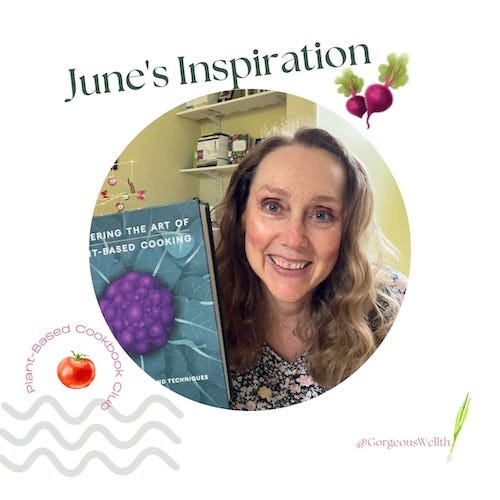It’s Never About Missing Meat - A Plant-Based Dilemma
June’s cookbook gives you lots of reasons to enjoy plants
Hi there and welcome to Roots! I'm so glad you're here. If you're enjoying what you're reading so far and haven’t subscribed yet, please click that button:
And if you like this post, please tap that heart button ❤️ and leave a comment as that helps the algorithm push this content out to more like-minded souls who might enjoy it. Thank you for being here!
“Don’t you miss meat?”
I get that a lot from people who can’t fathom life without meat.
Meat is a part of our culture. It’s what we put on the table.
In fact, it’s grown so rapidly, meat output has increased 2.5-fold in the last 60 years here in North America alone.
People attribute this to many factors, including technological advances, economic growth, and urbanization, to name just a few. In general, the wealthier a culture gets, the more meat they eat.
That’s causing problems. Health problems. Environmental problems.
We subsidize meat and dairy production. Plant-based alternatives receive no subsidies at all - which is why, when you compare them, they are so much more expensive.
Which leads right back to production - there’s more meat because it’s being driven across many, many channels.
More meat means more people eat meat. A LOT of meat.
So how on earth could you ever make any meal good without it?
It’s simple.
When you discover flavor, you start enjoying your meals.
If you throw a couple of veggies - peas and carrots - into a pot and heat them up, they don’t have much flavor. Especially if they were grown months before, and are processed and stored for longevity.
Focus on quality food - freshly grown fruits and veggies - and you’ll quickly find there’s more flavor in the outcome.
It’s also not about replacement, or losing something in the process. You don’t “take away the meat” or “replace the main ingredient,” which is always meat.
Instead, you make fruits and veggies the star of the show. It changes your approach. It changes the outcome. Because you’re creating the best meal possible … Using plants as the main ingredient!
And, ohhh, the outcome. When a chef gets that, the food is exquisite. They know how to bring out rich flavors. They understand what it takes to make food taste good. Only then can they be plant-based chefs.
Because meat-based chefs will never understand that. I was meat-driven for almost 40 years of my life. I loved the salty, addictive qualities in bacon, sausage, and pepperoni. I loved the chew of a really good hamburger. I started by “taking away” meat, which meant my “sides” were marginal at best.
Slowly, slowly, I learned how to rethink my approach.
What if food could always be the best, taste the best? What if I understood how to make the best meal possible from the ingredients I WANTED to put into my body? Ingredients I knew were better for me because they made me feel better? Day in and day out.
It’s a switch. One that takes time. And only then do you change the question around …
“Don’t you miss fruits and veggies?”
Another Cookbook to help you discover plants …
I follow lots of book lists that alert me to new cookbooks being published. (Does that make me a nerd? I’ll own it.) That’s how I found this month’s cookbook.
Mastering The Art of Plant-Based Cooking
By Joe Yonan
How could you not include a cookbook from someone who is a two-time James Beard Award-winning food and dining editor of The Washington Post? And trust me, you get your money’s worth with this cookbook. You could cook with this for an entire year and eat really well.
Maybe it’s because he’s pulled together so many plant-based contributors to help with its creation. Or maybe it’s because it’s part education and part really good food. That’s something I demand from all the cookbooks I use regularly.
Okay, if you’re striving for plant-based, you’ve likely noticed an uptick in the plant-based resources that are available today. Plant-based is everywhere - in every market, restaurants in every city. It’s easier than ever to stick with plant-based, even in the smallest locations.
Yonan confirms it.
“While the number of vegetarians has ticked up to 6 percent, with half of those vegan, the percentage who say they sometimes eat vegetarian or vegan meals jumped from 36 percent in 2015 to 63 percent in 2022.”
Plant-based is a lifestyle. It’s not a diet. Or a trend.
It’s about eating good-for-you food in the best possible way.
“‘Vegan’ is a lifestyle and a commitment, while ‘plant-based’ is just dinner.”
Yes. I agree.
Plant-based gets back to the roots of what makes us human in the first place. We are one with nature. We derive our energy from what nature gives us. Not a lab. Not a concentrated animal feeding operation (CAFO) that produces over 90 percent of meat and eggs in the US.
Food should be good.
Food should add energy. Give us health. And wellness.
And bring us joy.
Maybe that starts with cooking from a place of kitchen joy. With finding such great food to prepare, you LOVE doing it.
A good place to start is right here.
p.s. Did you like this message? It would mean a lot to me if you’d press the ❤️ below if you liked it, left a comment 💬, or shared it with a friend. I’m trying to grow this publication, and I depend on people like you to do so!
And if you’re new here, Welcome! 💐 I’d love to start sharing my message with you if you’re interested in all things plant-powered, proaging, or finding kitchen joy. Subscribe … and then explore my entire archive! Glad to share with you! 🙋🏼♀️







